Anianus was a Gallo-Roman nobleman who served as the referendary of Alaric II, king of the Visigoths. He was a vir spectabilis , that is, an "admirable man", or holder of high office in the empire. [1]
Anianus was tasked by Alaric to authenticate with his signature the official copies of the Breviary of Alaric, [2] which had been distilled by other legal writers from the Codex Theodosianus . [3] In his signature he used the Latin words Anianus, vir spectabilis subscripsi et edidi, and it is probable that, from a misunderstanding of the word edidi, proceeded the common notion that he was the author or editor of the work, which has sometimes been called Breviarium Aniani. He was not, and only functioned in the capacity of referendary, to authenticate the books themselves. [3]
Anianus' authentication of the copies of this work took place at Aire (modern Aire-sur-l'Adour) 506 AD. [4]
The medieval writer Sigebert of Gembloux says that this Anianus translated from Greek into Latin the work of John Chrysostom on Matthew the Apostle, [5] but it's now considered likely he was mistaken and instead meant Anianus of Celeda.
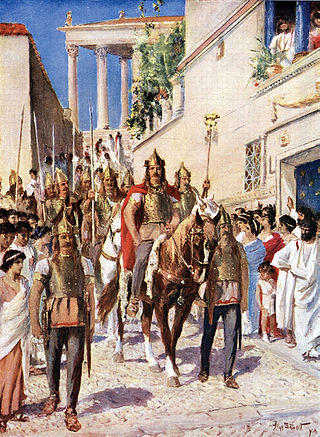
Alaric I was the first king of the Visigoths, from 395 to 410. He rose to leadership of the Goths who came to occupy Moesia—territory acquired a couple of decades earlier by a combined force of Goths and Alans after the Battle of Adrianople.

Alaric II was the King of the Visigoths from 484 until 507. He succeeded his father Euric as king of the Visigoths in Toulouse on 28 December 484; he was the great-grandson of the more famous Alaric I, who sacked Rome in 410. He established his capital at Aire-sur-l'Adour in Aquitaine. His dominions included not only the majority of Hispania but also Gallia Aquitania and the greater part of an as-yet undivided Gallia Narbonensis.
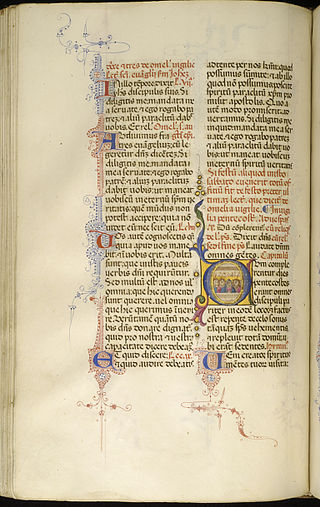
The Roman Breviary is a breviary of the Roman Rite in the Catholic Church. A liturgical book, it contains public or canonical prayers, hymns, the Psalms, readings, and notations for everyday use, especially by bishops, priests, and deacons in the Divine Office.

The Breviary of Alaric is a collection of Roman law, compiled by Roman jurists and issued by referendary Anianus on the order of Alaric II, King of the Visigoths, with the approval of his bishops and nobles. It was promulgated on 2 February 506, the 22nd year of his reign. It applied, not to the Visigothic nobles who lived under their own law, which had been formulated by Euric, but to the Hispano-Roman and Gallo-Roman population, living under Visigoth rule south of the Loire and, in Book 16, to the members of the Trinitarian Catholic Church; the Visigoths were Arian and maintained their own clergy.
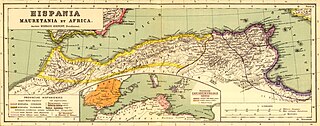
Mauretania is the Latin name for a region in the ancient Maghreb. It stretched from central present-day Algeria westwards to the Atlantic, covering northern present-day Morocco, and southward to the Atlas Mountains. Its native inhabitants, of Berber ancestry, were known to the Romans as the Mauri and the Masaesyli.

Hilary of Poitiers was Bishop of Poitiers and a Doctor of the Church. He was sometimes referred to as the "Hammer of the Arians" and the "Athanasius of the West". His name comes from the Latin word for happy or cheerful. In addition to his important work as bishop, Hilary was married and the father of Abra of Poitiers, a nun and saint who became known for her charity.
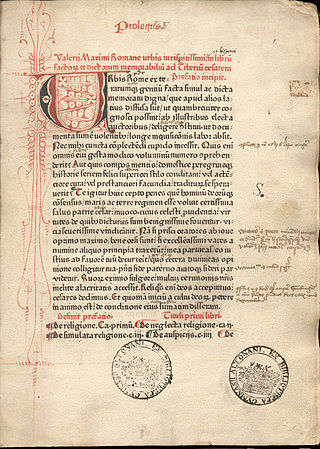
Valerius Maximus was a 1st-century Latin writer and author of a collection of historical anecdotes: Factorum et dictorum memorabilium libri IX. He worked during the reign of Tiberius.
Karl Wilhelm Dindorf was a German classical scholar. He was born and died at Leipzig.
Olympiodorus of Thebes was a Roman historian, poet, philosopher and diplomat of the early fifth century. He produced a History in twenty-two volumes, written in Greek, dedicated to the Emperor Theodosius II, detailing events in the Western Roman Empire between 407 and 425.
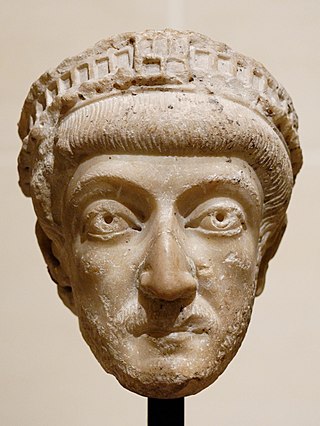
The Codex Theodosianus was a compilation of the laws of the Roman Empire under the Christian emperors since 312. A commission was established by Emperor Theodosius II and his co-emperor Valentinian III on 26 March 429 and the compilation was published by a constitution of 15 February 438. It went into force in the eastern and western parts of the empire on 1 January 439. The original text of the codex is also found in the Breviary of Alaric, promulgated on 2 February 506.
Eutropius, scholarly abbreviated Eutr., Eutr. Brev. or Eutrop., was a Roman official and historian. His book Breviarium Historiae Romanae summarizes events from the founding of Rome in the 8th century BC down to the author's lifetime. Appreciated by later generations for its clear presentation and writing style, the Breviarium can be used as a supplement to more comprehensive Roman historical texts which have survived in fragmentary condition.

Sigebert of Gembloux was a medieval author, known mainly as a pro-Imperial historian of a universal chronicle, opposed to the expansive papacy of Gregory VII and Pascal II. Early in his life he became a monk in the Benedictine abbey of Gembloux.
Greece in the Roman era describes the Roman conquest of the territory of the modern nation-state of Greece as well as that of the Greek people and the areas they inhabited and ruled historically. It covers the periods when Greece was dominated first by the Roman Republic and then by the Roman Empire. In the history of Greece, the Roman era began with the Corinthian defeat in the Battle of Corinth in 146 BC. However, before the Achaean War, the Roman Republic had been steadily gaining control of mainland Greece by defeating the Kingdom of Macedon in a series of conflicts known as the Macedonian Wars. The Fourth Macedonian War ended at the Battle of Pydna in 148 BC with the defeat of the Macedonian royal pretender Andriscus.

Gembloux Abbey was a Benedictine abbey near Gembloux in the province of Namur, Wallonia, Belgium. Since 1860, its buildings host the University of Liège's Gembloux Agro-Bio Tech faculty and campus.
Referendary is the English form of a number of administrative positions, of various rank, in chanceries and other official organizations in Europe.

Festus was a Late Roman historian. His name appears in some manuscripts as Rufius Festus, Rufus Festus, Sextus Rufus or Sextus Festus, but they appear to be corruptions. He is mainly known as the author of a epitome titled Breviarium rerum gestarum populi Romani, written around AD 370 and commissioned by the Eastern emperor Valens in preparation for his war against Persia. The Breviarium covers the entire history of the Roman state from the foundation of the city. The book consists of 30 chapters treating Roman events in a terse overview, mainly focused on military and political conflicts. It is estimated as a work of very low quality.
Tonantius Ferreolus, was a vir clarissimus, or Gallo-Roman senator.

The Diocese of Dacia was a diocese of the later Roman Empire, in the area of modern western Bulgaria, central Serbia, Montenegro, northern Albania and northern North Macedonia. It was subordinate to the Praetorian prefecture of Illyricum. Its capital was at Serdica.
Paeanius, was a late Roman lawyer and translator who lived in the Eastern provinces. He was author of a translation into Greek language of the Latin historical work of Eutropius, the Breviarium ab urbe condita. His translation, which has survived in a handful of manuscripts, is a rare example of a near-contemporary translation from Latin to Greek, as Eutropius’s Breviarium was written in 369 and translated by Paeanius around 379.
The gens Rufia, occasionally spelled Ruffia, was a minor plebeian family at ancient Rome. Members of this gens are not mentioned in history until imperial times, and they achieved little prominence until the late third century, from which time the family rose in importance, gaining the consulship on a number of occasions from the time of Constantine the Great to that of Justinian, and frequently holding the post of praefectus urbi.
![]() This article incorporates text from a publication now in the public domain : Graves, John Thomas (1870). "Anianus". In Smith, William (ed.). Dictionary of Greek and Roman Biography and Mythology . Vol. 1. p. 178.
This article incorporates text from a publication now in the public domain : Graves, John Thomas (1870). "Anianus". In Smith, William (ed.). Dictionary of Greek and Roman Biography and Mythology . Vol. 1. p. 178.










